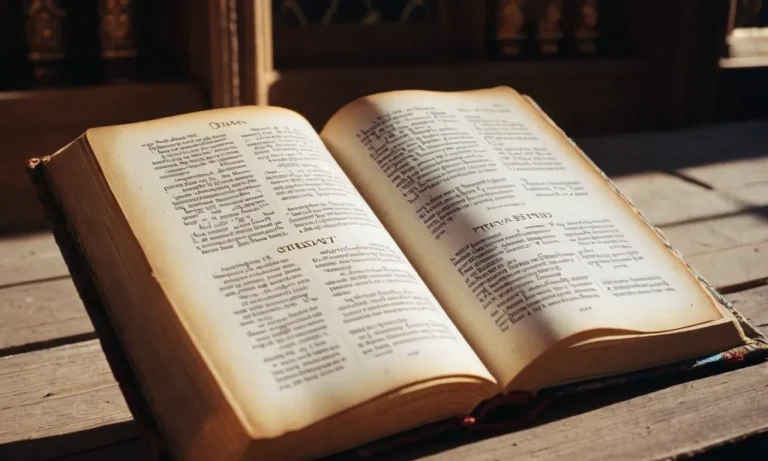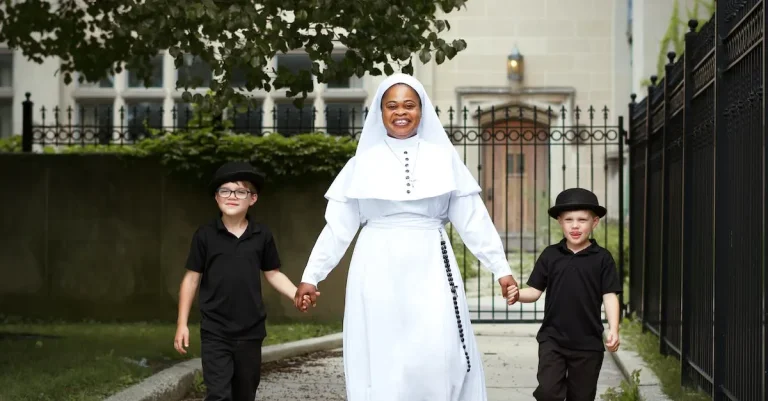Why Did God Choose Deborah?
The story of Deborah in the Bible is one that intrigues many readers. As the only female judge of Israel mentioned in the scriptures, her role stands out. If you’re looking for a quick answer, God chose Deborah because of her wisdom, faithfulness and the leadership skills He had gifted her with.
This article will take an in-depth look at the circumstances surrounding Deborah’s appointment as judge of Israel and why God selected her for this vital role.
In this article, we will examine Deborah’s background, the oppression of Israel during her time, the qualities that made her an ideal leader, the victory God gave Israel through her leadership, and the legacy of faith and courage she left behind.
By exploring these key aspects of Deborah’s story, we can gain insight into why she was singled out for the unique role God entrusted her with.
Background on Deborah
Her name and family
Deborah’s name means “bee” in Hebrew. She was the wife of Lapidoth, but little else is known about her family. Some scholars believe Deborah was likely from the tribe of Ephraim, since she judged Israel in the hill country of Ephraim (Judges 4:5).
Her role as a prophetess
Deborah was considered a prophetess of God. She would sit under a palm tree between Ramah and Bethel in the hill country of Ephraim, where Israelites would come to her for judgment (Judges 4:4-5). As a prophetess, Deborah likely provided leadership to her community by settling disputes, offering wisdom, and speaking messages from God.
Her wisdom and reputation
Deborah was known for her wisdom and leadership capabilities. People respected her and would come from far and wide for her counsel. She was also bold and decisive in calling Barak into action against Israel’s enemies.
Her reputation as a respected prophetess and judge shows she was exceptional among her peers.
Some key facts about Deborah’s wisdom and reputation:
- She was considered a “mother in Israel” – a sign of great honor and authority (Judges 5:7).
- She gave military strategy to Barak that was key to victory (Judges 4:6-7, 14).
- The Bible emphasizes her role as a leader, not just as a wife (Judges 4:4-5).
- Deborah was chosen to serve as a judge at a pivotal time when Israel had no strong leadership (Judges 4:1-5).
Israel’s Oppression by Jabin and Sisera
Jabin’s powerful army
The cruel King Jabin of Canaan oppressed the Israelites for 20 years with his vast and mighty army. Under the command of Sisera, Jabin’s army had 900 iron chariots, making it nearly invincible at the time (Judges 4:3). The Israelites were terrified and helpless against this formidable force.
Many were killed or taken captive as slaves. Jabin and Sisera controlled major trade routes and exploited the Israelites economically. It was a dark time for Israel.
The suffering of the Israelites
Under Jabin’s harsh rule, the Israelites suffered greatly. They lived in constant fear and could not travel freely in their own land. Many lost their livelihoods and possessions. Families were torn apart as loved ones were taken captive or killed.
Food and resources were scarce as Sisera’s army looted the towns. The people cried out to God for deliverance from this unbearable oppression.
For 20 long years, the Israelites endured tremendous hardship and injustice. Their spirits were crushed under the weight of Canaanite tyranny. Enslaved in their own land, the Israelites felt abandoned by God. They wondered if He still cared about His chosen people.
The situation seemed hopeless as Jabin and Sisera’s grip only tightened.
Cries for deliverance
Eventually, the misery became too much for the Israelites. They pleaded with God to rescue them from Jabin and Sisera’s cruelty. Though lacking an army or weapons, the people trusted that the Lord could somehow help them overcome the vast Canaanite forces.
They appealed to God’s compassion and covenant faithfulness. The Bible records their desperate cries, saying “the Israelites cried out to the LORD” (Judges 4:3). They were utterly dependent on divine intervention.
The prophets Deborah and Barak urged the people to keep praying and believing despite their dire circumstances (Judges 4:6-7). They assured the Israelites that God heard their cries and would send a judge to save them as He had done before. This sparked a flicker of hope within the community.
Though Jabin’s grip remained tight, the Israelites gained new confidence that the Lord would fulfill His promises and redeem their situation in His perfect timing.
Deborah’s Leadership Qualities
Her close relationship with God
As a prophetess and judge over Israel, Deborah had a very close connection with God that enabled her to lead effectively (Judges 4:4). She would sit under a palm tree between Ramah and Bethel in the hill country of Ephraim and the Israelites would come to her for settling disputes (Judges 4:5).
This highlights how God’s spirit spoke through her. According to the Blue Letter Bible, the phrase “led by the Spirit” in ancient Hebrew often refers to prophecy, so she acted as a messenger for the Lord’s words.
Her close communion with God means she was a devout servant chosen to convey His message.
In addition, the biblical account portrays Deborah as composing and singing a song of praise commemorating the victory over Israel’s enemies (Judges 5). The song shows her poetic gifts as well as fervent faith and gratitude toward God.
Her musical talent found further expression in summoning the military commander Barak with the words: “Has not the Lord gone out before you?” (Judges 4:14). So she had no doubts about God ensuring success. This reveals her steadfast trust and affection for the Almighty as his devoted prophetess.
Her discernment and courage
As an astute judge over Israel, Deborah displayed sharp discernment in resolving disputes justly (Judges 4:5). Her status and wisdom is reflected in Israelites traveling far for her counsel. Furthermore, she discerned God’s will in calling Barak to mobilize against Israel’s Canaanite oppressors.
Her foresight perceived that a window of opportunity had opened under the opposing general’s, Sisera, inept leadership. Boldly declaring “this is the day” (Judges 4:14) to confront their enemies highlighted her clarity and determination as a leader.
However, Barak wavered in his courage, reluctant to go without Deborah (Judges 4:8). In contrast, her bravery stands out all the more, willingly facing dangers on the battlefield. This was not an expected role for a female leader.
But her pluck and energy ignited Israelite resistance culminating in Sisera’s forces being swept away (Judges 4:16). Through discernment of God’s timing and undaunted courage, Deborah was the catalyst for victory. Her charisma surely inspired troops in the midst of battle too.
Her position as judge of Israel
Out of all the judges named in Scripture, Deborah is the only female given the designate title of “judge” (Hebrew shophetet). This distinguished role placed her in the highest level of societal leadership as an arbiter and administrator over Israel for over 40 years based on Judges 5:31.
Managing disputes and settling issues brought renown that attracted Israelites to her palm tree court from far and wide. Her fame spread to the battlefield as well based on the Song of Deborah which proclaimed: “When leaders lead in Israel, when the people willingly offer themselves, bless the LORD!”
(Judges 5:2).
As one site noted, she blazed a trail for subsequent female figures of prominence like Huldah the prophetess. In fact, Deborah’s civic authority exceeds the influence of most Old Testament prophets serving more as a national leader.
In a memorable era where “the highways were abandoned” (Judges 5:6), her judgeship kept the Israelites bound to faith and the law. This was FulfilledProphecy’s perspective. So amid chaos Deborah kept order through fair governance and community rapport.
Truly she was an early model of principled justice in civic duty.
Israel’s Victory Under Deborah’s Command
Deborah’s instruction to Barak
As recorded in Judges 4, Deborah the prophetess summoned Barak son of Abinoam and instructed him: “The Lord, the God of Israel, commands you: ‘Go, take with you ten thousand men of Naphtali and Zebulun and lead them up to Mount Tabor.
I will lead Sisera, the commander of Jabin’s army, with his chariots and his troops to the Kishon River and give him into your hands.'” This was a daring battle plan, as Sisera had 900 iron chariots, giving him an overwhelming military advantage on the open plains (Judges 4:3).
Yet Barak agreed to the battle if Deborah would go with him.
The defeat of Sisera’s forces
What happened next was nothing short of miraculous. As Deborah prophesied, the Lord threw Sisera’s army into confusion when they met Barak’s forces at the Kishon River, and not a single man was left (Judges 4:16). As they tried retreating, Sisera himself abandoned his chariot and fled on foot.
He escaped to the tent of Jael, the wife of Heber the Kenite, thinking he would be safe there. But Jael drove a tent peg through his temple as he slept from exhaustion, fulfilling Deborah’s prophecy that the Lord would deliver Sisera into the hands of a woman (Judges 4:9).
The fulfillment of Deborah’s prophecy
The song of Deborah and Barak in Judges 5 is one of joyful praise over God’s deliverance. “Villagers in Israel would not fight; they held back until I, Deborah, arose, until I arose, a mother in Israel” (Judges 5:7).
Deborah was not a warrior herself, yet God chose her wisdom, leadership, and prophecy to inspire the people’s trust and victory. Though seemingly underqualified in man’s eyes, God used this ordinary woman to lead His people against impossible odds and prove that salvation comes from Him alone.
Deborah’s Enduring Legacy of Faith
A respected leader and prophetess
Deborah was an amazing woman of faith who served as a judge and prophetess over Israel during a turbulent time. Though women leaders were rare in the ancient world, the people looked to Deborah for guidance because of her reputation for wisdom and fair judgment (Judges 4:4-5).
Deborah would sit under a palm tree between Ramah and Bethel and settle disputes for the Israelites who sought her counsel. Her leadership united the tribes and gave hope during oppressive times.
As a prophetess, Deborah heard from God and delivered His words to the people. She called for military action against the Canaanites and affirmed God’s promise to deliver Israel through the commander Barak (Judges 4:6-7). Deborah believed God’s word even when others were afraid.
Her faith was a light in a dark time of Israel’s history.
An example of courage
Deborah displayed remarkable courage in leading Israel to face their enemies. Though Barak agreed to go into battle, he wanted Deborah at his side (Judges 4:8). Deborah boldly reminded Barak that God was directing him, but she bravely went with him nonetheless.
Her presence inspired the troops to pursue and defeat the Canaanites (Judges 4:14-16).
Deborah also showed courage in composing a song of victory after the battle (Judges 5). She praised God for empowering His people to stand against Sisera’s mighty army. The song emphasized that God fought for Israel because they cried out to Him, highlighting the importance of faith in difficult times.
Deborah was not afraid to glorify God and commemorate His faithfulness.
A woman of wisdom and godliness
The book of Judges describes Deborah as “a woman of excellence” (Judges 4:4). She was respected for her keen discernment and fair judgments. People saw the spirit of wisdom on Deborah, so they sought her counsel to settle disputes justly (Judges 4:5). Her reputation spread far and wide.
In addition to wisdom, Deborah exemplified godliness. She constantly pointed people to trust God rather than relying on human strength. Deborah encouraged Barak to have faith in God’s power to save (Judges 4:6-7).
Her life modeled putting one’s confidence in the Lord instead of horses and chariots (Psalm 20:7). Deborah was a spiritual mentor for Israel.
Deborah’s faith, courage, wisdom, and godly example left an enduring legacy in Israel. Though cultures viewed women as inferior, Deborah rose above because of her relationship with God. She inspires all believers to boldly follow the Lord’s leading and trust in His strength.
Deborah lives on as a reminder that God can use anyone willing to follow Him in faith.
Conclusion
In examining the story of Deborah, we gain insight into the traits that led God to appoint her judge over Israel. Even in a patriarchal culture, Deborah stood out as a prophetess and leader who walked closely with God, discerned His will, and operated in wisdom and bold faith.
When Israel was oppressed and male leaders were fearful, Deborah obeyed God’s call to deliver the nation, resulting in dramatic victory. Her legacy as a woman of faith and courage continues to inspire believers today.
Ultimately, it was Deborah’s godly character and giftings that set her apart for the vital leadership role God chose her for.








